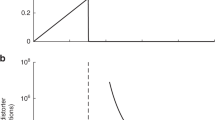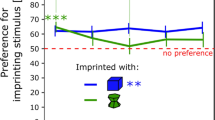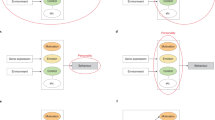Abstract
A RECENT symposium on imprinting1 focuses attention on a very important aspect of animal behaviour. Although Thorpe2 and Verplank3 have emphasized that imprinting should be considered in relation to other types of learning, one aspect which does not appear to have received much consideration is the question of the relevance of imprinting to ideas on the evolution of learning and of instinctive behaviour.
This is a preview of subscription content, access via your institution
Access options
Subscribe to this journal
Receive 51 print issues and online access
$199.00 per year
only $3.90 per issue
Buy this article
- Purchase on Springer Link
- Instant access to full article PDF
Prices may be subject to local taxes which are calculated during checkout
Similar content being viewed by others
References
Thorpe, W. H., et al., Brit. J. Animal Behav., 3, 121 (1955).
Thorpe, W. H., Symp. Soc. Exp. Biol., 4, 387 (1950).
Verplank, W. S., Brit. J. Animal Behav., 3, 123 (1955).
Waddington, C. H., Nature, 169, 278 (1952); Evolution, 7, 118 (1953).
Thorpe, W. H., Nature, 173, 465 (1954).
Thorpe, W. H., Proc. Roy. Soc., B, 126, 370 (1938).
Author information
Authors and Affiliations
Rights and permissions
About this article
Cite this article
EWER, R. Imprinting in Animal Behaviour. Nature 177, 227–228 (1956). https://doi.org/10.1038/177227b0
Issue Date:
DOI: https://doi.org/10.1038/177227b0
This article is cited by
-
Why and how the early-life environment affects development of coping behaviours
Behavioral Ecology and Sociobiology (2018)
-
A Game-Theoretic Analysis of the Baldwin Effect
Erkenntnis (2012)
-
A checklist of papers since 1951 dealing with imprinting in birds
The Psychological Record (1963)
-
Imprinting and the Evolution of Instincts
Nature (1956)
Comments
By submitting a comment you agree to abide by our Terms and Community Guidelines. If you find something abusive or that does not comply with our terms or guidelines please flag it as inappropriate.



